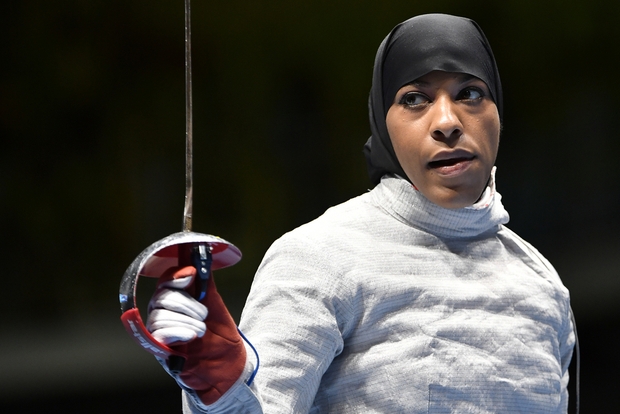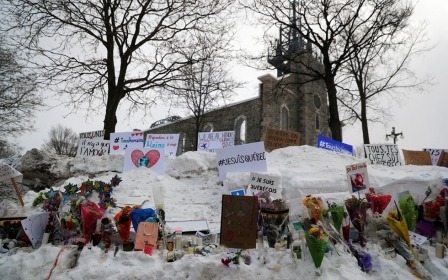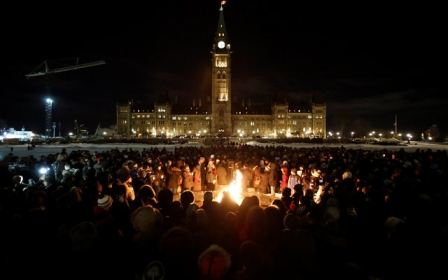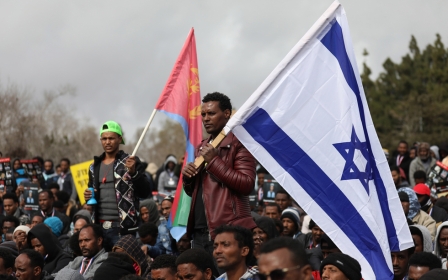US border guards deny entry to Canadian Muslim mother
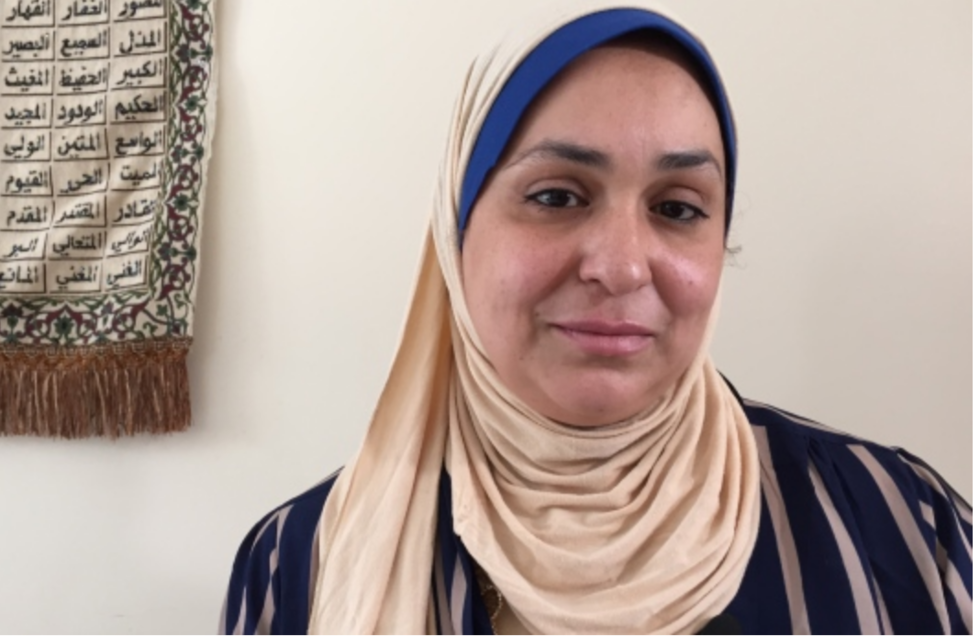
TORONTO, Canada – It started out as any other family day-trip to the United States.
But what should have been a happy occasion turned into something different for Fadwa Alaoui, after she was interrogated, forced to hand over her cell phone and eventually denied entry into the US at a border crossing in southern Quebec last weekend.
“It’s shocking. It’s frustrating. It’s humiliating,” Alaoui told Middle East Eye over the phone on Friday.
She said she set out for Burlington, Vermont, on 4 February with her cousin, 18-month-old daughter, and 5-year-old son, Yusuf, whom she hoped to cheer up because he had just finished chemotherapy sessions.
At first, when the family arrived at the Canada-US border crossing in Philipsburg, Quebec, the questions were nothing out of the ordinary: "Where are you going and how long do you plan on staying in the US?"
But then Alaoui said the border officer asked where she was born and how long she had been in Canada, before telling her to pull over and come into the US Customs and Border Protection (CBP) office.
Once inside, she said CBP officers confiscated her and her cousin’s cell phones, and then interrogated them each separately.
"I was scared. I didn’t know why they did all of this with us… Is it because we’re Muslim, because of our religion?”
- Fadwa Alaoui
“The questions were questions like, are you Muslim? Are you practicing? What mosque do you go to? What is the mosque called? How often do you go? What does the imam say at the mosque?” said Alaoui, a Moroccan-born Canadian citizen who has lived in Canada more than 20 years.
The interrogation then turned political.
“He asked me, ‘What do you think of Donald Trump?’ I thought I wasn’t understanding him. I said, ‘Excuse me, what?’ He said, ‘Yes, Donald Trump’s politics.’ I answered, ‘It doesn’t concern me, he can do what he wants in his country.’”
After more than four hours at the border crossing, during which time she was photographed and fingerprinted, Alaoui and her family were denied entry into the US and forced to turn back.
“I’m used to going in and out of the US without any problems, so this was the first time that this happened,” she said. “I was scared. I didn’t know why they did all of this with us… Is it because we’re Muslim, because of our religion?”
Less than a week after Alaoui's ordeal, another Canadian of Moroccan origins reported similar treatment at the US border.
On Thursday, a 19-year-old student-athlete, Yassine Aber, said he was interrogated at a US border crossing near Stanstead, Quebec, while on his way to a track and field meet in Boston. Aber was born in Canada to Moroccan parents and was travelling on a Canadian passport.
He told CBC News he was questioned for five hours and was asked about his Muslim faith, his family's origins, and how often he goes to the mosque. He also had his phone searched.
He was eventually denied entry, while his teammates and coach from the University of Sherbrooke were allowed to continue on.
"I received an official paper saying I didn't have papers, a passport or an immigration visa that was valid. My passport is Canadian and it expires in 2026," Aber told CBC.
A ‘troubling’ incident
A spokesperson for Public Safety Canada said the information that has been made public about Alaoui's incident “is troubling” and Minister Ralph Goodale is looking into it.
“We are following up on this matter. We expect all Canadians to be treated fairly in all circumstances,” Scott Bardsley said in a brief email.
Alaoui also met with her local parliament member, Alexandra Mendes, on Thursday, and she gave her the papers she signed at the border and all of the details of what happened. “Now it’s in their hands and they will do the follow-up,” Alaoui said.
Dave Long, a public affairs official with US Customs and Border Protection (CBP), said he was prohibited from sharing information about individual travellers.
Long said, however, that CBP’s top priority “is the prevention of the entry of terrorists and their weapons” into the US and “CBP does not discriminate on the entry of foreign nationals to the United States based on religion, race, ethnicity or sexual orientation”.
Travellers who feel they have been treated unfairly can request to see a CBP supervisor, or file a written complaint online, he told MEE in an emailed statement.
About 400,000 people cross the US-Canada border every day for work, pleasure or family reasons, according to Canadian government data.
CBP officers have the authority to search any person entering the US, including US citizens, and they say this includes looking through travellers’ baggage, as well as their electronic devices, like cell phones, laptop computers, and hard drives.
CBP officers have a great deal of discretion in deciding who gets admitted into the country; they also maintain that they may ask travellers a range of personal questions. Non-compliance often leads to being denied entry into the US.
Border search exemption
But this system is not new, and examples of Canadians and other nationals being denied entry at a US border crossing are common.
Last September, Canadian journalist Ed Ou, who has reported from across the Middle East, was denied entry into the US after he refused to hand his cell phones over to CBP officers.
While he was told the official reason he was refused entry was “classified,” Ou said he wondered “if the real reasons had anything to do with the fact that I was going to cover Standing Rock,” the indigenous-led protest camp against a pipeline in North Dakota.
“That would mean that the U.S. is actively censoring its own narrative and suppressing access to information,” Ou wrote in TIME Magazine.
According to the Committee to Protect Journalists, while the US Supreme Court has not ruled on electronic searches, “it has upheld the so-called ‘border search exception’ to the Fourth Amendment's requirement that authorities obtain a warrant to search items coming into the US”.
In January, several Canadian citizens were reportedly denied entry into the US after they told US border agents they intended to protest US President Donald Trump’s inauguration.
"Even though I represent Team USA and I have that Olympic hardware, it doesn't change how you look and how people perceive you”
- Ibtihal Muhammad
Sasha Dyck, of Montreal, said he and a group of Canadians and French nationals were fingerprinted, had their cell phones searched, and were held for several hours while crossing the border to go to Washington, DC, for the Women’s March last month.
“At the end they said, 'You have to turn back,’” he told CBC Montreal.
The order bans refugees and immigrants from seven Muslim-majority countries in the Middle East and Africa – Syria, Libya, Iran, Iraq, Yemen, Somalia and Sudan – from entering the US. It has been challenged as unconstitutional, and a federal court upheld a stay blocking its implementation on Thursday.
Olympic athlete Ibtihal Muhammad, a US citizen, said this week that she was detained at an airport with no explanation, and was “sad and upset and disheartened”.
“I can't tell you why it happened to me, but I know that I'm Muslim. I have an Arabic name. And even though I represent Team USA and I have that Olympic hardware, it doesn't change how you look and how people perceive you,” she said in an interview with Popsugar.
Questions remain
Meanwhile, Alaoui said she was concerned she might be denied entry into the US in the future.
That would keep her from her mother, father, brothers and other relatives who hold US citizenship and live in Chicago.
“The US is like my second country… I’m worried. I have my father. I have my mother, my brothers. More for my parents, if ever I can’t go visit them, it’s serious,” she said.
“I didn’t do anything that would [necessitate] this. I was travelling with my children on my Canadian passport and I still don’t understand how, with a Canadian passport, they treated us this way.”
New MEE newsletter: Jerusalem Dispatch
Sign up to get the latest insights and analysis on Israel-Palestine, alongside Turkey Unpacked and other MEE newsletters
Middle East Eye delivers independent and unrivalled coverage and analysis of the Middle East, North Africa and beyond. To learn more about republishing this content and the associated fees, please fill out this form. More about MEE can be found here.


